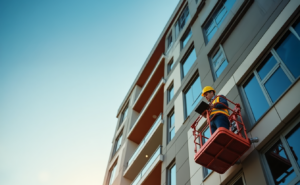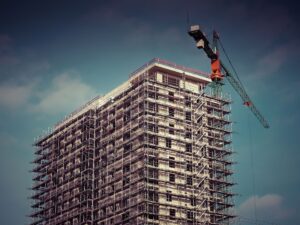In the UK, sunshine is precious. With the weather so topsy turvy even in the summer months, the British public jump on any opportunity to take advantage of a heatwave. And what says heatwave better than a barbecue? However, for those living in apartment buildings with no garden, the options for a suitable venue can be limited, and the only choice may seem to be hosting a balcony barbeque.
As a tenant or owner of a flat, you may be wondering, “can I have a barbecue on a balcony in the UK?” or “is it safe to barbecue on a balcony?”. That’s why we put together this article – so you can understand the laws and regulations surrounding barbecuing on a balcony and the risks of doing so.
Balcony Barbeque Rules
There are no explicitly written laws that prohibit barbecuing on balconies. However, multiple authoritative parties strongly advise against it – for example, the London Fire Brigade urges people to avoid having barbecues on balconies, citing over 550 balcony fires over the last three years.
Also, most landlords will specify in leases that barbecuing on the balconies in their buildings is prohibited. And even if this isn’t the case, it’s worth chatting to your neighbours before firing up the grill, as the close-quarter nature of most apartment buildings means that you’re spreading the potential risk to them.
The Risks of Balcony BBQs
Balcony BBQs can be very dangerous for several reasons. The most obvious hazard of barbecuing on a balcony is the potential to start a fire, which could cause catastrophic damage across multiple homes in a block of flats. Barbecuing and hot weather go hand in hand, but because of this, the risk of starting a fire with a balcony barbecue can be even higher.
The risk can be further increased by the material that your balcony is built from – if you enjoy panoramic views of the city from wooden decking, then, of course, you shouldn’t mix fire into the equation. And even if you feel the BBQ is under control, even the slightest error when putting it out or leaving embers behind can lead to disaster. In fact, just over a year ago, in May 2020, there was a large fire at a block of flats in Deptford, South-East London. A disposable barbecue was left in a plastic bag on decking, leading to the destruction and damage of multiple flats, as well as the evacuation of over 100 tenants.
And beyond simply burning your and your neighbour’s homes down, barbecues can also be a hazard in other ways. Barbecues, including disposable BBQs, give off carbon monoxide for hours even after they’ve been put out. Giving off these fumes on a balcony close to where you live and sleep is extremely dangerous and puts you at risk of fatal asphyxiation – remember, carbon monoxide is odourless and tasteless, so you may not know until it’s too late.
It’s also worth noting that with a BBQ often comes the enjoyment of alcoholic beverages, which can be a risk in itself. As a responsible adult, this may feel like patronising advice – but according to MORE TH>N, British people have caused over £617 million in property damage due to drunken barbecuing, independent of the clearly more dangerous balcony environment.
Is There Such a Thing as a “Balcony Friendly Barbeque?”
Now that you know the risks, you might be considering the best ways to reduce them. Perhaps you’re wondering whether a small propane barbecue for a balcony is somehow safer than a charcoal grill or even the disposable options. If this is the case, then sadly, you are mistaken. The LFB considers all barbecues to be of a similar risk level to property, especially on balconies.
What should I do?
Our advice when looking to have a barbecue would be to simply have it somewhere else. Maybe a friend or family member has a garden that you can use for an afternoon, or perhaps you take a few disposables out to an open space with no rules against open flames. Barbecuing on a balcony truly appears to be much more trouble than it’s worth, with the potential risks highly outweighing the gains.
When barbecuing in public places, choose your location wisely. Most parks and commons will have rules against barbecuing, and the Countryside Code states that barbecues are forbidden in the countryside unless specified. However, in spaces with clearly dedicated firepits and with plenty of effective ways on hand to control the fires, a barbecue out in the wild can be a real summer delight.
For information on property management and how Strangford Management can help, visit our blog.
Read more…
- EWS1 Form Explained: Hidden Requirements Your Surveyor Won’t Tell You
- NHBC Cover Explained: Your Essential Guide for Leaseholders (2025)
- Ministers Set £30bn Cladding Crisis Deadline for 2029
- Service Charge Disputes Made Simple: Your Rights as a Leaseholder
- Breaking: Leasehold Reform Scraps Two-Year Wait Rule From January 2025




